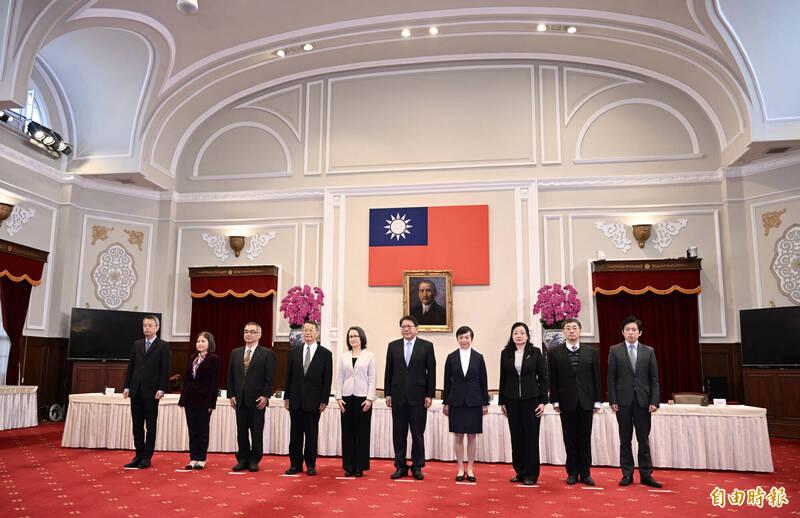Seven new nominees for the Constitutional Court were announced by Vice President Hsiao Bi-khim (蕭美琴) today, including Taiwan High Prosecutors’ Office Chief Prosecutor Tsai Chiu-ming (蔡秋明) as nominee for Judicial Yuan president and Supreme Court Justice Su Su-o (蘇素娥) as nominee for Judicial Yuan vice president.
The other five nominees are National Chung-Cheng University law professor Hsiao Wen-sheng (蕭文生), Supreme Court Justice Cheng Chun-hui (鄭純惠), Taiwan High Prosecutors’ Office Chief Prosecutor Lin Li-ying (林麗瑩), well-known law scholar Chen Tzu-yang (陳慈陽) and National Chengchi University law professor Chan Chen-jung (詹鎮榮).
The nominees’ expertise covers civil, criminal, administrative and constitutional law, and would result in a judiciary that the public can trust, the Presidential Office said.

Photo: Lo Pei-de, Taipei Times
President William Lai (賴清德) nominated the aforementioned candidates to fill the seven current vacancies in the Constitutional Court and ensure it can operate normally, Hsiao said.
Lai made the nominations after careful consideration and consulting with various parties, and would ask the Legislative Yuan to approve the nominees today, she said.
Lai made the nominations with three main considerations, Hsiao said.
First, to safeguard freedom, democracy and the constitution, and defend the public’s human rights, she said.
Second, to enhance professional expertise in national security cases, ensuring national security and clean politics, she said.
Third, to promote judicial reforms, improve the quality of trials and relieve pressure in the judicial working environment, she added.
Lai had previously nominated seven candidates for the Constitutional Court in August last year, but all were rejected by the Legislative Yuan in December last year.
This prevented the Judicial Yuan from being able to function normally and disrupted the separation of powers between the five branches of government, Hsiao said.
The ruling and opposition parties would hopefully agree this time, upholding professionalism and considering diverse issues that concern the public, she said.
Taiwan is currently facing a serious constitutional crisis with power imbalances between the government’s five branches, Tsai said in his speech after the announcement.
Many legal and political challenges brought about by agencies involve constitutional issues that should be addressed by the Constitutional Court, he said.
While there has been much criticism regarding courts and trials, the core of the issue is that judges, prosecutors and other judicial staff are under immense pressure, Tsai said.
He would address this and the quality of trials, striving to create a healthier judicial environment, he said.
Additional reporting by Su Yung-yao

Taiwan has received more than US$70 million in royalties as of the end of last year from developing the F-16V jet as countries worldwide purchase or upgrade to this popular model, government and military officials said on Saturday. Taiwan funded the development of the F-16V jet and ended up the sole investor as other countries withdrew from the program. Now the F-16V is increasingly popular and countries must pay Taiwan a percentage in royalties when they purchase new F-16V aircraft or upgrade older F-16 models. The next five years are expected to be the peak for these royalties, with Taiwan potentially earning

STAY IN YOUR LANE: As the US and Israel attack Iran, the ministry has warned China not to overstep by including Taiwanese citizens in its evacuation orders The Ministry of Foreign Affairs (MOFA) yesterday rebuked a statement by China’s embassy in Israel that it would evacuate Taiwanese holders of Chinese travel documents from Israel amid the latter’s escalating conflict with Iran. Tensions have risen across the Middle East in the wake of US and Israeli airstrikes on Iran beginning Saturday. China subsequently issued an evacuation notice for its citizens. In a news release, the Chinese embassy in Israel said holders of “Taiwan compatriot permits (台胞證)” issued to Taiwanese nationals by Chinese authorities for travel to China — could register for evacuation to Egypt. In Taipei, the ministry yesterday said Taiwan

‘LIKE-MINDED PARTNER’: Tako van Popta said it would be inappropriate to delay signing the deal with Taiwan because of China, adding he would promote the issue Canadian senators have stressed Taiwan’s importance for international trade and expressed enthusiasm for ensuring the Taiwan-Canada trade cooperation framework agreement is implemented this year. Representative to Canada Harry Tseng (曾厚仁) in an interview with the Central News Agency (CNA) said he was increasingly uneasy about Ottawa’s delays in signing the agreement, especially as Ottawa has warmed toward Beijing. There are “no negotiations left. Not only [is it] initialed, we have three versions of the text ready: English, French and Mandarin,” Tseng said. “That tells you how close we are to the final signature.” Tseng said that he hoped Canadian Prime Minister Mark Carney

POSITIVE DEVELOPMENT: Japan and the US are expected to hold in-depth discussions on Taiwan-related issues during the meeting next month, Japanese sources said The holding of a Japan-US leaders’ meeting ahead of US President Donald Trump’s visit to China is positive news for Taiwan, former Japan-Taiwan Exchange Association representative Hiroyasu Izumi said yesterday. After the Liberal Democratic Party’s landslide victory in Japan’s House of Representatives election, Japanese Prime Minister Sanae Takaichi is scheduled to visit the US next month, where she is to meet with Trump ahead of the US president’s planned visit to China from March 31 to April 2 for a meeting with Chinese President Xi Jinping (習近平). Japan and the US are expected to hold in-depth discussions on Taiwan-related issues during the